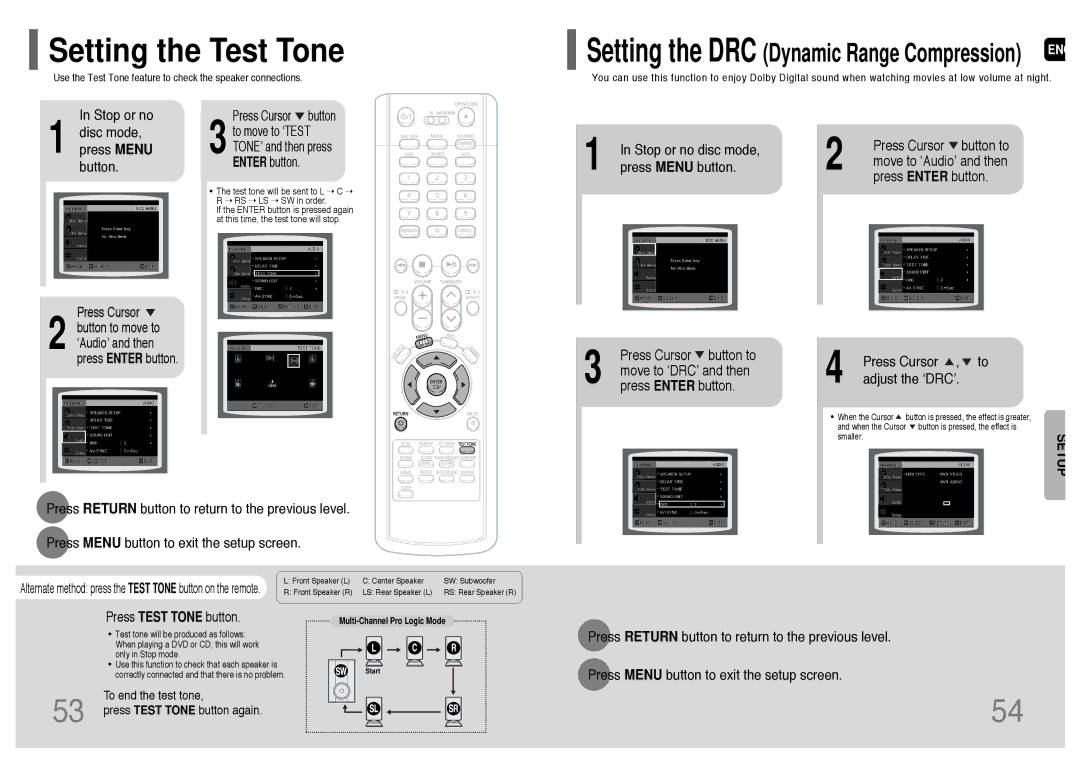
 Setting the Test Tone
Setting the Test Tone
Use the Test Tone feature to check the speaker connections.
Setting the DRC (Dynamic Range Compression) | ENG |
|
You can use this function to enjoy Dolby Digital sound when watching movies at low volume at night.
In Stop or no
1 disc mode, press MENU button.
Press Cursor ![]() 2 button to move to
2 button to move to
Press Cursor ![]() button
button
3 to move to ‘TEST TONE’ and then press ENTER button.
•The test tone will be sent to L ➝ C ➝ R ➝ RS ➝ LS ➝ SW in order.
If the ENTER button is pressed again at this time, the test tone will stop.
| 1 | In | Stop or no disc mode, |
| 2 |
|
| Press Cursor button to | |||
| press MENU button. |
|
|
| move to ‘Audio’ and then | ||||||
|
|
|
|
|
|
|
|
|
| press ENTER button. | |
|
|
|
|
|
|
|
|
|
|
|
|
|
|
|
|
|
|
|
|
|
|
|
|
|
|
|
|
|
|
|
|
|
|
|
|
|
|
|
|
|
|
|
|
|
|
|
|
‘Audio’ and then press ENTER button.
3 | Press Cursor button to |
move to ‘DRC’ and then | |
press ENTER button. | |
|
|
4 Press Cursor  ,
,  to adjust the ‘DRC’.
to adjust the ‘DRC’.
•When the Cursor ![]() button is pressed, the effect is greater, and when the Cursor
button is pressed, the effect is greater, and when the Cursor ![]() button is pressed, the effect is smaller.
button is pressed, the effect is smaller.
SETUP
Press RETURN button to return to the previous level.
Press MENU button to exit the setup screen.
Alternate method: press the TEST TONE button on the remote. | L: Front Speaker (L) | C: Center Speaker | SW: Subwoofer | |
R: Front Speaker (R) | LS: Rear Speaker (L) | RS: Rear Speaker (R) | ||
| Press TEST TONE button. |
| ||
| • Test tone will be produced as follows: |
|
|
|
| When playing a DVD or CD, this will work |
|
|
|
| only in Stop mode. |
|
|
|
| • Use this function to check that each speaker is |
| Start |
|
| correctly connected and that there is no problem. |
| ||
|
|
| ||
53 | To end the test tone, |
|
|
|
press TEST TONE button again. |
|
|
| |
Press RETURN button to return to the previous level.
Press MENU button to exit the setup screen.
54
